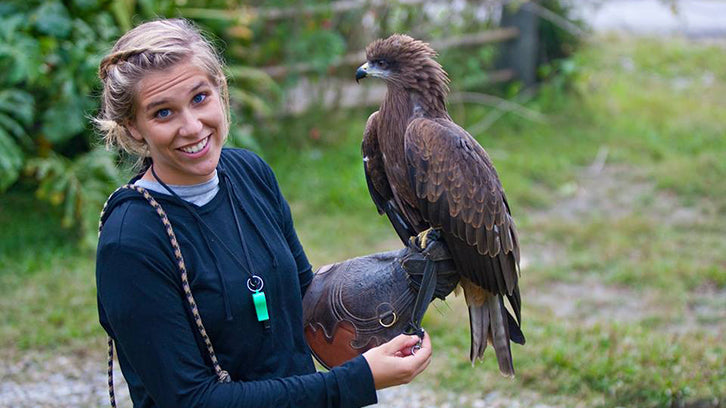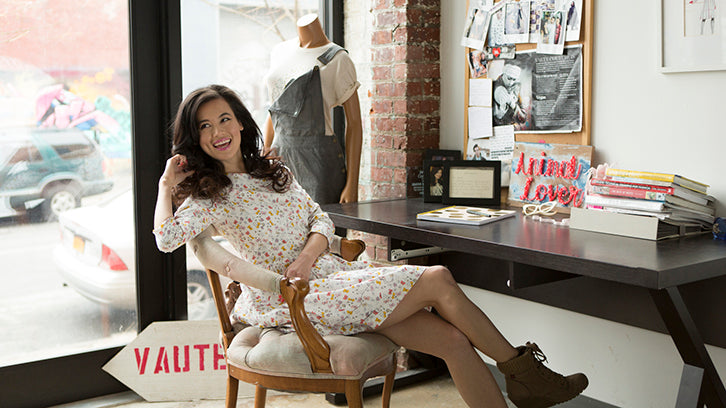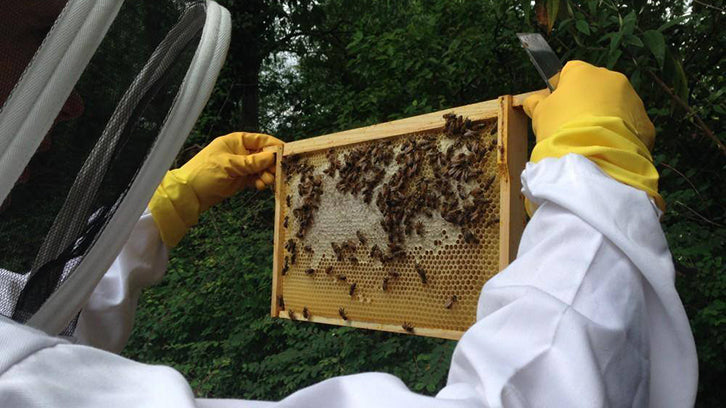
It’s 4:30 PM on a Wednesday. You’re on the clock until 5, but you’ve finished the all of the sweeping or checked out your last customer or filed the day’s paperwork. It’s prime time for daydreaming: what would it be like to be your own boss? You close your eyes, and you’re running a little beachside tiki bar, or taking that leather-tooling hobby to the next level. It’s a good way to kill 30 minutes.
Ahh, the impossible dream!
But then I started thinking: is it so impossible? Most of the entrepreneurs I know didn’t go to business school, or take over a family company. They had no formal training, or mentor to help them. These small business owners come from diverse backgrounds – retail sales and law school and the TV industry. Unconventional resumes for people who now juggle marketing and customer service and design and shipping, right? Maybe not.
What is the profile of an entrepreneur? What’s the required skill set? A pinch of fearlessness, a lot of drive, the ability to self-start, a knack for business? It’s a mixed bag, partially learned and somewhat innate. And these many-hat-wearing folks, for the most part, gleaned their knowledge through an eclectic history of experiences, and things picked up from past jobs.
Can your day job help you kick start your dream job, too? Consider the following:
- Does your company have a program to help subsidize the cost of educational workshops, courses, or conferences?
- Can you identify anyone with mentor-potential within your organization?
- Is it possible to take a risk-free unpaid leave or negotiate reduced hours while you work on building your business?
- What other skills can you learn and what resources are available to you?
I spoke to ten Shopify merchants who started their careers as beekeepers and models and bankers. Their resumes, on the surface, may not seem relevant, but these entrepreneurs draw from their past work experiences every day.
Ten day jobs that have entrepreneur training baked in:
1. Former Career: Zookeeper
Entrepreneur skills acquired: Multitasking, juggling irregular hours, customer service
“I worked a lot with animals but it’s also very important to provide an education and to acknowledge the visitors – I gained a lot of my customer service skills and experience in that profession. I learned how to make customers happy with compromise (“No, you really can’t pet this bird; but I can give you a peacock feather to take home!”). I think having a unique job with weird requirements and hours helped me to prepare for the one-woman show I currently run. At the zoo, I was always on my feet, doing different tasks – no two days were the same. It’s natural for me to juggle multiple activities at once. My current lifestyle is similarly a very active job, not a typical 9-5, which is what I’m familiar and comfortable with. I don’t think I could sit at a desk or computer all day, everyday.”
– Taylor Scarboro, Owner, Sugar & Succulents

2. Former Career: Case Worker, Social Development
Entrepreneur skills acquired: listening, customer service/care, versatility, problem-solving
“My job was to find a solution to people’s problems and at times they were life and death situations. I had to think fast under pressure while providing the best possible customer service. My time with the Ministry was the biggest training ground for me as I never had any formal education in business. Everything I learned, I’m able to apply to my business life: Spend more time listening than talking. In business if you’re not listening to your customer, you’re leaving a lot of business on the table and there is no room for you to grow and improve. Kindness and compassion – you may think this has nothing to do with business but I strongly believe they should be must-haves in all business cultures. At the end of the day without people, business is nothing, we are nothing. You need to be able to understand your customer from their perspective, you don’t need to agree but regardless you need to be kind and show compassion towards them. And, don’t be scared to try new things – in my previous job, things were never black and white, so I was forced to think of different ways to solve problems. In business you will need to get out of your comfort zone and do things you’ve never done before. Yes it can be scary but you will never know otherwise.”
– Gustavia Lui, Owner, Staavias
At the end of the day without people, business is nothing, we are nothing.
3. Former Career: Insurance Claims Adjuster
Entrepreneur skills acquired: organization, patience
“Working in insurance adjusting can be stressful in a catastrophe situation. For everyone. Most importantly, the people that’s been affected by a hurricane, flood or other natural disaster. You’re there to take care of them. Patience and organization is absolute key while you help someone get their lives back on track.”
– Barcus Patty, Owner, Thrice
4. Former Career: Model
Entrepreneur skills acquired: photography, styling, marketing
“The way people should start businesses is to look at their lives and ask themselves, «What are the tools I’ve been given that no one else has been given, that add up basically to strategy where I win?» I modelled for Ford Models, and because of that, I know how to run a casting. I know how to run a photoshoot. I know what clothes look like on and off a person. And that’s the online marketing version of fashion.”
– Leanne Mai-ly Hilgart, Founder, President and Creative Director, Vaute
The way people should start businesses is to look at their lives and ask themselves, ‘What are the tools I’ve been given that no one else has been given?’

5. Former Career: Business Development Manager, Food Industry
Entrepreneur skills acquired: curation, UX, branding
“Working in the food tech sector, my role was to identify key partners who would build and identify a brand then on-board them to our mobile apps, ready to promote to our customers. I realised the importance of curation. The importance to present customers with only the best products in an industry and brands can affect the UX for better or for worse. With my new knowledge of curation and my previous experience of onboarding brands I got to work contacting designers I wanted on our website in December and went from 15 to 50 designers in two months. I would say I am like most early business owners where in essence, you want everything to work right now, but I have learned through working with startups that the best thing to do is start slow, fix operational issues, push it a bit, fix more techy issues then push harder. A key bit of advice I was given when I decided to leave my job was to focus on getting people to love your brand than people to like your brand which is something I stick by and I am always reaching out to strike conversation with our customers. It helps me to really understand who they are but most importantly, they get to understand us, what we do and why we do it and hopefully start loving us!”
– Lewis Phillips, Owner, The Pommier
6. Former Careers: Beekeeper / Tech Startups
Entrepreneur skills acquired: patience, perseverance
«I’ve been keeping bees since 2005 as my hobby and antidote to the stress of running several high-tech start up companies. Around 2008 my wife and I started experimenting with making lip balms and hand creams in our kitchen using the honey, beeswax and propolis from our bees. The main lesson I learned from my previous commercial life (and possibly the bees) was one of patience and probably stubbornness. I just knew in my gut that there was a market for our products and great feedback from our customers kept us going even though the business was not yet profitable – I sometimes think it’s a thin line between stubbornness and stupidity, but there will always be times where you will simply want to give up and walk away. Nothing comes easily and if you stick it out long enough,and if the product is “right” you will eventually succeed.»
– Simon Cavill, Founder, Bee Good Skincare

7. Former Careers: Brand Manager, Healthcare / Relationship Manager, Banking
Entrepreneur skills acquired: branding, networking, negotiation, accounting, communication
“It helped to have worked in 2 very different industries (banking and healthcare) and in different roles (finance and marketing). To run a small business, you need to know a little bit about everything. You also need to understand how the different parts of the business work together. I constantly draw on experiences that I had in my prior roles. Even though the industries were totally different from pet products, the fundamentals are similar. Accounting classes and my prior career in banking have been invaluable in teaching me how to forecast, budget, determine pricing, and run scenarios. You have to know what is driving sales, costs, and margins in order to build a business strategy and optimize your business.”
– Diane Danforth, Owner, Pawdentify
To run a small business, you need to know a little bit about everything. I constantly draw on experiences that I had in my prior roles.
8. Former Career: Set Decorator, Film Industry
Entrepreneur skills acquired: sourcing, curation, networking
“My job back then was to source very specific things for films. They would say ‘We need a yellow couch’. I would go everywhere to find something that would do. My whole job was to familiarize myself with the city and all the corners, all the places. I began to know what’s in all the stores. I have fairly good visual memory because of that, and it comes in handy now. As I was doing that job, I was building my resources for film but was also finding interesting things that I was using in my own life. I said, ‘I want to get out of film. I want to use the skills I’ve acquired of taking the best options and creating something cohesive and beautiful and useful.’”
– Sophia Pierro, Owner, Present Day Gifts
9. Former Career: Broadcasting
Entrepreneur skills acquired: writing, photography, strategy, goal-setting
“For 10 years, I’ve worked for a major TV broadcaster, as a news and documentary script editor, narrator and occasional news reader. My training in strategic planning helps me envision the big picture, identify goals and the steps needed to get there (and switch gears, as necessary). We actually cut the cord with regular 9-to-5 employment some time ago and have made a decent living as freelancers, so our mindset is pretty entrepreneurial. The TV writing experience has helped me learn how to write concise, compelling stories and pick the right images to illustrate them. That helps when I’m writing blog posts and catalog copy. It’s made me a better visual thinker. And taught me that I always need to view what I’m creating through the eyes of the audience.”
– Virginia Sorrells, Co-Owner, Ajimi Ichiba
My training in strategic planning helps me envision the big picture, identify goals and the steps needed to get there.
10. Former Career: Real Estate Broker
Entrepreneur skills acquired: negotiation, hustle
“The cutthroat Manhattan real estate business was an amazing course in negotiation, hustle, and remaining focused on the end goal of putting together and making a deal work. These skills have come in very handy with suppliers, vendors and designers, especially in a start up with very little capital. Managing all the different personalities and finessing situations to get the deal done comes into play every single day managing Hamptons Glow.”
– Rachel Thompson, Owner, Hamptons Glow
The cutthroat Manhattan real estate business was an amazing course in negotiation and hustle.
Suddenly, mid-daydream, you snap back into a reality: you don’t have any clue how to run a business, right? But maybe you do. Inadvertently, your career is giving you the skills to forge out on your own.
Don’t quit your day job just yet, though – get paid to learn while you work on your side hustle.
Leave A Comment